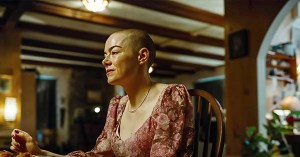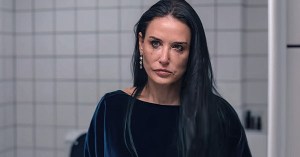Vikings Showrunner Michael Hirst Talks Season 4, Writing Women, and Game of Thrones Comparisons
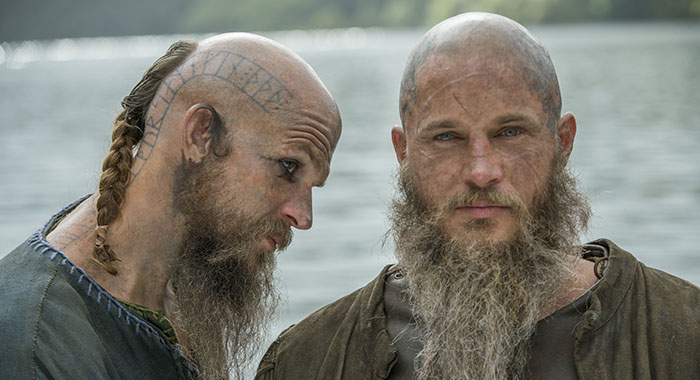
Last we saw Vikings’ Ragnar Lothbrok (Travis Fimmel), it was some years after his brutal defeat to Rollo (Clive Standen) in Paris, and he’d returned to Kattegat after a long, self-imposed exile. His four sons, now young adults and themselves formidable fighters-in-training, met his return with apprehension and contempt as their estranged father challenged one among them to strike him dead and claim himself king.
After a season of being addled with drug addiction and violent erraticism, Ragnar has taught us to to expect the unexpected from him, yes, but also to not entirely trust him. Even four seasons in, we can’t say for certain what’s veiled behind Fimmel’s steely gaze. The greatest mystery, however, is what’s to come in the anticipated second part of season 4, which premieres with “The Outsider” on Wednesday.
Rotten Tomatoes spoke with writer, creator, executive producer, and showrunner Michael Hirst about expanding season 4 and the forthcoming season 5 to 20 episodes each instead of 10, writing for women, and what sets his Vikings apart from Game of Thrones.
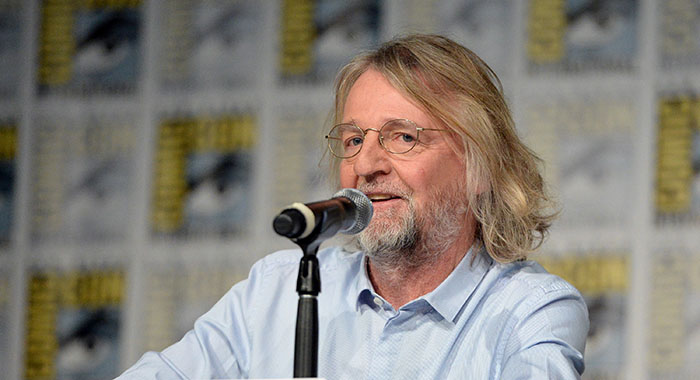
Benjamin Lindsay for Rotten Tomatoes: We’re spoiled this season with 20 episodes. What have been some of the pleasures of working in this expanded format? Was it the plan all along for what this story needed?
Michael Hirst: No, I don’t think so. Normally in TV drama, at the end of a season, you still don’t know whether it’s going to get picked up, and so you’re kind of trying to balance getting an arc to a story that might just finish where it finishes if it’s not picked up, but hoping it will be, so leaving a lot of open ends so you can go back to it. I always, actually, have had a deep belief that Vikings would go forward. And I actually have always had an ending in view, and the ending is several seasons away. I hope we get that.
The challenge for me when History and MTM decided to switch from 10 episodes to 20 was that we were more or less shooting all year, and since I’m the sole writer, that was a big challenge for me. Sometimes, we would have 10 live scripts, and I would be writing, correcting things, rewriting things, trying to move the script forward and everything. It has been challenging, I wouldn’t deny that. But at the same time, I love it. I’ve never stopped loving the process. There’s never any lack of material because the material comes from history. So it’s always a great journey for me.
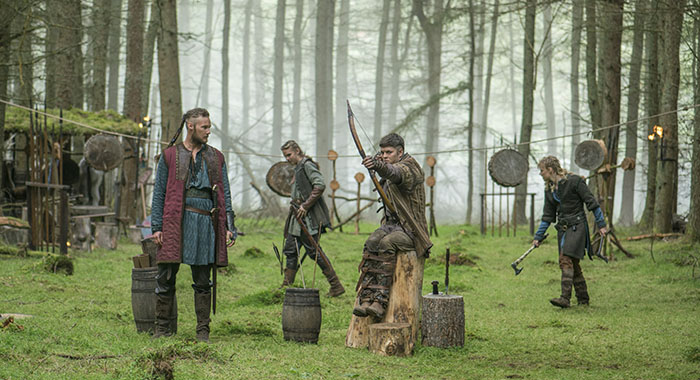
RT: One of the big surprises at the end of the midseason finale, “The Last Ship,” was the drastic jump forward in time. Was this simply to get Ragnar’s sons up to an age where they could be viable threats or leaders in their own right? What went into the decision to hit fast-forward?
Hirst: Well, from the moment that I started thinking about the show, or at least the moment that the lead characters would be Ragnar and his sons, I realized that I was in it theoretically for the long haul and that this would be one of the few shows that actually showed people growing up and people having children, and the children growing up. We had a lot of ground to cover, and I knew that at least two of Ragnar’s sons became as famous as he did. So that’s a question of how do you deal with those transitions? How do you plausibly deal with people growing up without the audience losing track of where they are?
And we did it before. I decided that I was never going to do [the time jump] in the break. I looked at previous shows where they move forward in time, and it’s nearly always been done in the break between seasons, and I thought that’s really an easy option and it’s kind of fake. You’re not being honest with the audience.
So we did the cut forward in time between Bjorn as a young boy and then casting Alexander [Ludwig] as his older self, and it worked fantastically well. I was always going to do that again, but of course I wanted the sons to mature. I needed the sons. It was a question of when, and it became obvious that the choice was when Ragnar suffered his huge defeat, because in Viking society, if a king or an earl lost the confidence of his people or suffered huge defeats, he would normally be killed and replaced and someone would step in immediately. But Ragnar is too famous for that.
So Ragnar disappears because he’s been defeated and he’s licking his wounds, and time passes. And in that time that he’s away, his sons grow up. That step forward is just long enough for the children to become young adults, and then Ragnar comes back into their lives. And he comes back for two reasons. One: We know that he loves his sons, and he wants to find out what’s happened to them. And the second thing is he has unfinished business in England.
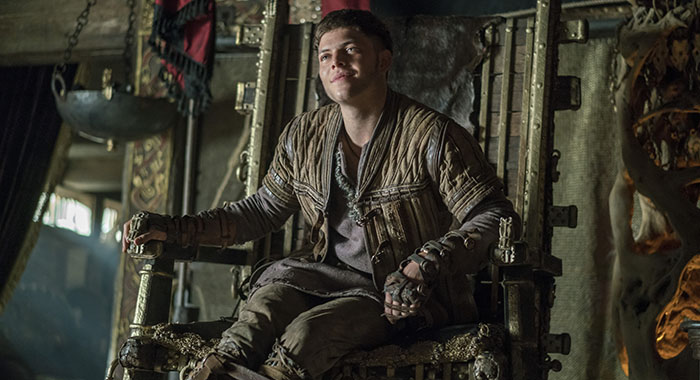
RT: The episode going into this week’s premiere is called “The Outsider,” which could apply to the return of Ragnar, but also the way that Ivar is alienated from society and his family. He’s such an angry character who’s crushed by the pressure of being his father’s son in addition to the pressure of living a normal life as a handicapped Viking. What development went into this character? He seems like one to watch.
Hirst: He is! Not least because the actor [Alex Høgh Andersen] is just phenomenal, and he’s going to be a big star. I always wanted to get to Ivar. Ivar is probably the most famous Viking of all time, notorious for his cruelty, but who knew that the most famous of all time would be a cripple? So from a writer’s point of view, that’s an amazing journey to go on, that’s an amazing character to deal with. He has lots of issues.
There are different interpretations, to be fair, about why he was called Ivar the Boneless, but it seemed to me that the one that was most compelling was that he had Brittle Bone Disease. We did a lot of research. We got in touch with people with Brittle Bone Disease. It’s one of those things that helps me enormously as a writer because I’m constantly trying to connect the past and the present, and so someone who has a condition that people still suffer from today, people can connect with that.
So however badly Ivar behaves, you will never totally lose sympathy with him because you know how difficult his life has been.
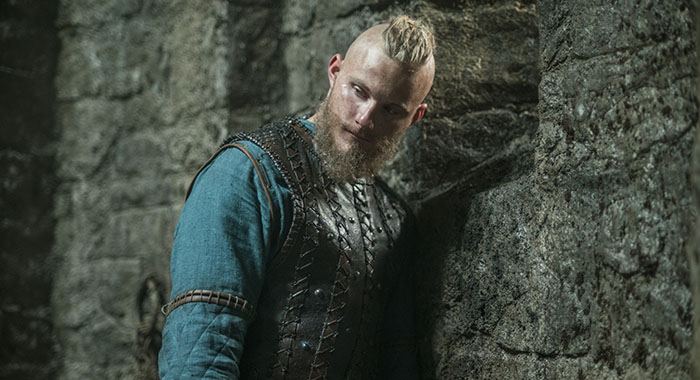
RT: Meanwhile, Bjorn is setting out to explore the Mediterranean, while his father wants to return to England. Floki (Gustaf Skarsgård) is even on Bjorn’s side. Is this the first sign of Ragnar being outshined by his sons?
Hirst: Absolutely. I think that maybe Ragnar thought that he could come back and claim the love and attention of his sons, but he’s been away too long, and as they say in Viking society, the smell of failure is pretty strong, so even your sons can reject you.
Bjorn has had a trajectory that was set from the moment he found that map in the raids in Paris, so he feels that his fate is to go to the Mediterranean. So he’s prepared to leave the Heathen Army to Ivar, which may or may not be a good thing. But it does mark [that] finally Bjorn is growing up and becoming a character in his own right.
And actually, historically speaking, again, Bjorn is very famous. He did ultimately sail around the Mediterranean. Amazing things happened to him, and within Viking society, Bjorn Ironside was a very mythical character by the time he died.
Ragnar said that one thing he feared was that his sons would become more famous than he was, and at least two of them do become more famous, and it’s interesting for me to watch their rise. I’ve watched children become men and then I watch the men become myths. It’s just a wonderful process.
I don’t mean to say this, but if you watch Game of Thrones, no one grows up. No one changes, everyone’s the same. In Vikings, things change the whole time. And one of the dynamics is that children become adults and then they have to find their own way in the world.
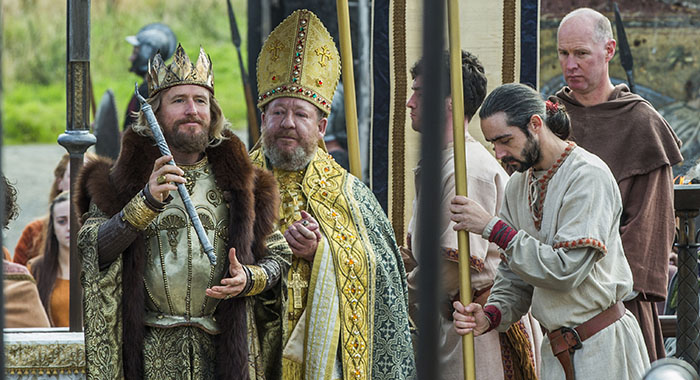
RT: That all said, I also get the impression that despite townspeople and his own sons telling Ragnar that the gods have spoken, that his failure seals his fate, we’re not meant to write him off quite yet. The Fates are stepping in.
Hirst: Yes, they have something else in store for him. And actually, he knows that his fate is to go back to England and to confront and see King Ecbert again. That relationship between those two kings was so wonderful and fundamental and interesting. I needed them to get back together again.
The actors of the characters, they both come from different places. Linus Roache is a classically trained actor, and Travis is a natural. He came out of his farm in the outback in Australia. So the two of them are so different; they represent different traditions and cultures and things. I needed fate to bring them back together again and spend some time in each other’s company.
I’d be prepared to say that episodes 4 and 5 of the new season are the best episodes I’ve ever done in TV, and that’s in large part because it involves Ragnar and Ecbert together.
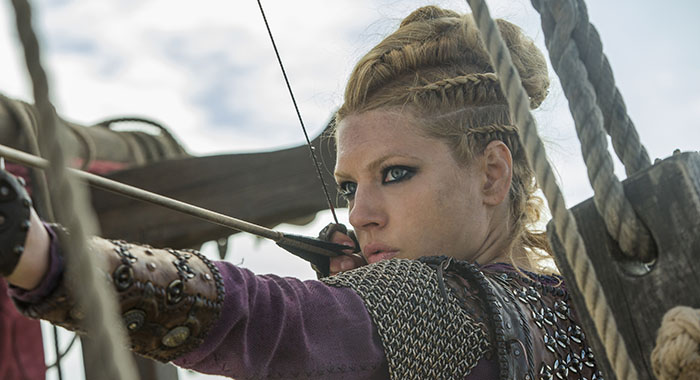
RT: I also love that in this episode that Lagertha is back. She’s such a great character, and it’s a great performance from Katheryn Winnick. Do you pride yourself in writing strong, complex roles for women?
Hirst: I do. I knew that when History bought the show that it was a male-skewed channel, but I think largely because there’s Lagertha, that it now has a huge female following. But also, all the major female characters in the show are different, they’re complex. We don’t use women in the senseless gratuitous way the way that Game of Thrones does. I’m interested in the female characters.
What I’ve done with Katheryn is I told her right from the start that I was going to throw her into every situation that I could think of that contemporary women would understand. Katheryn has just been amazing in all of these situations. One of the reasons that I’ve enjoyed writing female characters is because I did my Ph.D. on Henry James, and Henry James also loved writing women characters. He felt a special empathy for them because he said they always seemed to be trapped behind certain stiff barriers and had to use their imagination to get out of them or had to use some special way that the men didn’t need to fulfill their lives. I’ve got daughters, as well, two of whom are in the show.
It is a big feature of Vikings. Viking society was one of the few societies at the time, totally unlike the Anglo-Saxons or the Franks, where women were respected as an equal. They owned property. They could get divorced. I’m only reflecting what’s actually happening in Viking society.
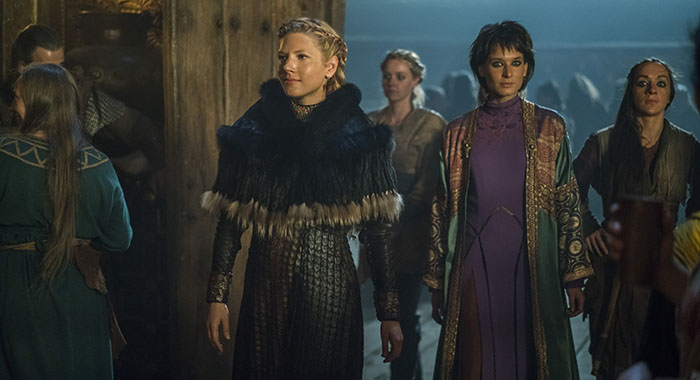
RT: On a grander scale, do you feel like there are present day issues that parallel Vikings? The old adage says that history repeats itself — what do you think we could glean as viewers from Vikings that’s applicable today?
Hirst: Well, I wish it was as simple as that. Even more than that, this show is about personal and political relationships, and they don’t change so much. One of the things I want to say to people is this isn’t really the past. This is how things have always been. You can see yourselves in these people. We’re not Vikings — of course we’re not. But human beings haven’t changed that much.
So I try to write things that resonate all the time in every conceivable way, because otherwise, I think the people won’t be interested. I just want people to engage with these characters at every turn. Who knew that you could empathize with eighth century pagans? That’s really the key to it.
Vikings season 4 returns Wednesday, Nov. 30 at 9 p.m. ET/PT on History

